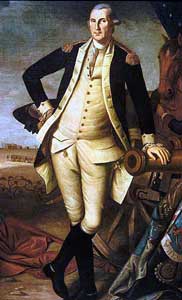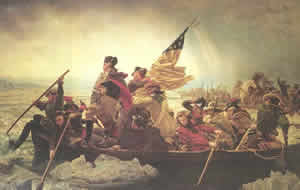 “The British are coming! The British are coming!”
“The British are coming! The British are coming!”
That cry that was immortalized as “The midnight ride of Paul Revere” comes form actual events from the battle of Lexington and Concord which might be viewed at the first open conflict between British and colonial forces that were leading up to a full scale revolutionary war.
“The British are coming! The British are coming!”
That cry that was immortalized as “The midnight ride of Paul Revere” comes form actual events from the battle of Lexington and Concord which might be viewed at the first open conflict between British and colonial forces that were leading up to a full scale revolutionary war. In the history of American ground warfare, this battle has continued to inspire patriots to what civilians can do to secure the future of a nation. And it is a classic example of a dispersed Army of an “occupation” resisting a much superior force through coordinated strategy and courage.
Much of the reason that the British were not able to easily take control of Lexington and Concord was advance intelligence work done by the colonists, which resulted in them knowing that on April 14, 1775, the British were going to make their move. The militia or “Minuteman” army that had been organized were nothing more than ordinary citizens like you and I. But they were armed and prepared to respond upon the signal to defend their homes. That signal came when Paul Revere made his historic ride after he was clued in by Dr. Joseph Warren that the British were on the move. Paul Revere’s courageous ride lead to his arrest by the British but it gave the Minutemen advance warning they needed to prepare for the arrival of the enemy.
The goal of the British in the advance on Lexington and Concord was to destroy the armaments of the colonists to try to suppress their ability to insight to rebellion. But because of the advance warning that patriotic “insiders” were able to leak to the colonists, the American ground combat forces or the Minutemen rallied as the British advanced. When the British troops crossed into Lexington, the opposition force was a small militia of only 75 men who were up against a much larger force. Eight patriots were killed and ten wounded in that opening battle but that encounter delayed the invading force and gave the militia in Concord to move the guns and ammunition to surrounding communities.

The outcome was that when the British finally reached Concord, their mission was frustrated because the bulk of the significant arms and ammunition had been relocated and hidden. They took out their frustrations by burning the few remaining supplies and a few canons that were in Concord. But this delay was being well used by the Minutemen as the alarm went out and patriots from many surrounding communities came running for a surprise ambush that would catch the British totally off guard.
Unable to complete their mission, the British began to go on the march back to Boston. But the Minutemen gathered in great numbers all along the path to Boston and attacked the British troops from every tree, bridge, rock and forest. These farmers and local trades’ people coalesced into an impressive American ground combat army that decimated the British forces using guerrilla tactics that were very hard for the British to respond to.
By the end of the battle of Lexington and Concord, the British had lost 73 soldiers and had casualties of 174, three times the losses of the Minutemen. Moreover, this open conflict is considered by many to be the beginning of the Revolutionary War, which led to the beginning of the nation of the United States of America.
